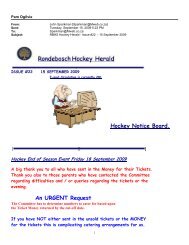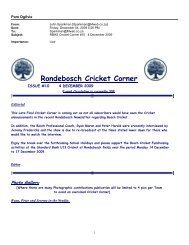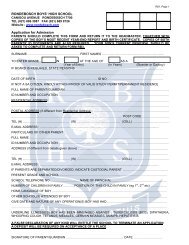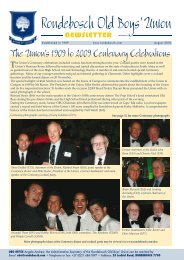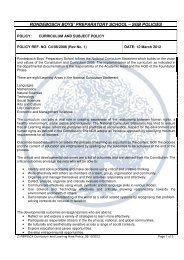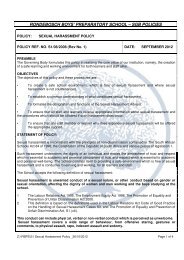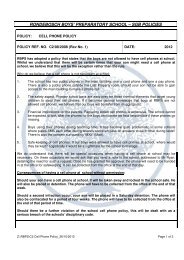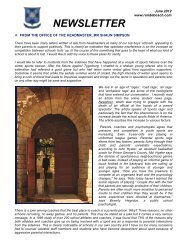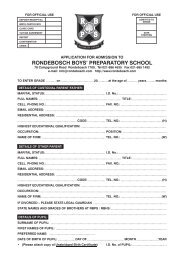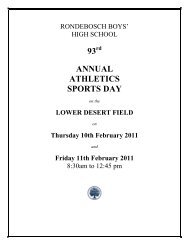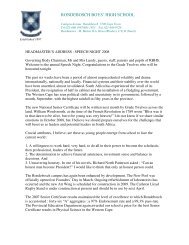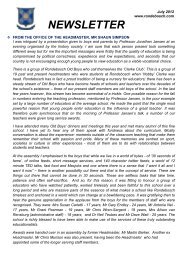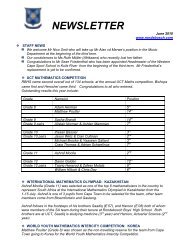Tickey de Jager Room speech 1 March 2011 - Rondebosch Boys
Tickey de Jager Room speech 1 March 2011 - Rondebosch Boys
Tickey de Jager Room speech 1 March 2011 - Rondebosch Boys
Create successful ePaper yourself
Turn your PDF publications into a flip-book with our unique Google optimized e-Paper software.
Speech <strong>de</strong>livered by Mike Reeler, Presi<strong>de</strong>nt of the Old <strong>Boys</strong>’ Union, at the<br />
opening of the <strong>Tickey</strong> <strong>de</strong> <strong>Jager</strong> Mathematics <strong>Room</strong> on 1 <strong>March</strong> <strong>2011</strong>.<br />
OPENING OF THE “TICKEY” DE JAGER MATHEMATICS ROOM<br />
1 MARCH <strong>2011</strong><br />
May I add my own personal words of welcome to all present and to say how honoured I feel to have<br />
been invited to perform this very important task. Also how very good it is to have Marianne <strong>de</strong> <strong>Jager</strong><br />
and David with us and to say how sad it is that Anne could not be here, but New Zealand is a very long<br />
way away.<br />
In June of 1920, a son was born to an impoverished farmer and his wife in a forgotten and <strong>de</strong>solate<br />
part of the Northern Cape. He was christened Cornelis Janse, but for the major part of his life was<br />
known affectionately by all who came into contact with him, friends, colleagues, acquaintances and<br />
even schoolboys (although never to his face!) as <strong>Tickey</strong>.<br />
Although his beginning was a very humble one in a home that had no electricity or running water and<br />
where new clothes were a seldom-experienced luxury and soap had to be manufactured from animal<br />
1
fat, it must have been a most enriching experience, for from it grew a man who had a remarkable<br />
career. <strong>Tickey</strong> himself acknowledged the enormous influence of his mother and father and the role<br />
they played in his subsequent <strong>de</strong>velopment. There was no school for him and his brother to attend so<br />
his mother un<strong>de</strong>rtook the task of teaching the two boys. <strong>Tickey</strong> once wrote a letter to his, then, 9-<br />
year-old granddaughter, Megan, in New Zealand, where he tried to explain to her what it was like<br />
during the first 9 years of his life and he had this to say, amongst other things, of his father:<br />
Because we were alone on a farm I spent nearly all my time with my father. My mother was<br />
trained as a teacher, but my father was a born teacher. He had a gift for making things clear<br />
and memorable. I still find south by using the Southern Cross and its pointers in the way he<br />
showed me one beautiful starry night. But it is not so much that he taught me so that I knew<br />
things; he taught me in a way that ma<strong>de</strong> me want to know things. The things you learn you<br />
may forget, but curiosity, the habit of wanting to know, lasts. He taught me arithmetic, and<br />
above all that in arithmetic you must know why you do things in the way you do. Why do you<br />
add from the right? I even learnt my first geometry from him. I was holding iron poles for him<br />
to drive into the ground with a fourteen pound sledge hammer to make a fence. As I was<br />
holding the second pole I asked him: "Dad, are you sure that this pole is in line with that pole.?"<br />
He looked down at me from the locust poison drum he was standing on: "Luister, twee pale is<br />
altyd in 'n lyn. Two poles are always in a line. Always. Everywhere. Amazing.<br />
I marvelled at this revelation for days.<br />
2
<strong>Tickey</strong>’s career at Ron<strong>de</strong>bosch began in 1945 after teaching in various schools, was interrupted for a<br />
7-year spell at Maitland High School, and then procee<strong>de</strong>d continuously from 1952 until he retired at<br />
the end of 1985. I came to know him first in October of 1957 when Clive Young and I were sent for a<br />
term to RBHS as stu<strong>de</strong>nt teachers. Those of you who atten<strong>de</strong>d the School as pupils will know that you<br />
cannot, in the eyes of the boys, go any lower in the homo sapiens scale than stu<strong>de</strong>nt teacher – we<br />
were terrified! <strong>Tickey</strong> was one of those amazing men, though, who could i<strong>de</strong>ntify with all and he<br />
certainly went out of his way to make us feel welcome. I later learnt what a truly amazing colleague he<br />
was and what an enormous privilege it was to sit at his feet to learn. He had a won<strong>de</strong>rful ability to<br />
help colleagues in ways very simple and effective. In an early part of my career I was asked by Mr Alex<br />
Clarke to teach Pure Chemistry to the Std 9s and 10s – funnily enough in the Allan Cormack Laboratory<br />
and in what is now the new Mathematics room. I went to <strong>Tickey</strong> for some advice: how was I to teach<br />
a std 9 Chemistry class that had Michael Buchner in it? Those of you who know Michael will see the<br />
merit of my query and for those of you who don’t, let me just say Michael Buchner was a very, very<br />
bright young man. <strong>Tickey</strong>’s answer: Mike, it’s simple – for YOU to teach Chemistry to Michael<br />
Buchner, just get out of his bloody way!!<br />
It was my first and most important lesson in the teaching of the very intelligent.<br />
3
<strong>Tickey</strong> <strong>de</strong> <strong>Jager</strong> was a writer, teacher, sports coach and may I add one other, horticulturalist. He was<br />
author of numerous mathematics text books ranging from classroom texts to teachers’ texts to<br />
textbooks for teaching the gifted mathematician. For this he is acknowledged nationwi<strong>de</strong>, even<br />
internationally. But I have <strong>de</strong>scribed him as a writer because it is not only his authorship of textbooks,<br />
but also the poetry and prose he wrote with such beauty, insight and humour. His love poems to girls<br />
he taught, his <strong>de</strong>scription of events and his erudite expositions on subjects that interested him make<br />
enjoyable and eye-opening reading. He loved to work with words, to use them to blend magic for<br />
himself and his rea<strong>de</strong>rs and to share his sometimes innermost thoughts with others. Some of his work<br />
is extremely serious, other parts are rather more frivolous and often combining both. He wrote a<br />
poem he called THE RONDEBOSCH UNDER TEN A which I use to emphasis this<br />
In the last match of the season<br />
You of the Un<strong>de</strong>r Ten<br />
Played with the grit and spirit<br />
And with the hearts of men.<br />
You tackled and you tackled,<br />
You ran and drove and scrummed,<br />
And through the entire team<br />
4
Enthusiasm hummed.<br />
You will do more important things -<br />
Grow sensible and wise;<br />
See the world more clearly<br />
And with less starry eyes.<br />
But part of what you will become<br />
Was forged upon this day -<br />
A character and confi<strong>de</strong>nce<br />
That will forever stay.<br />
So make a point of meeting<br />
At a time still far away,<br />
On the twenty-ninth of August<br />
And let your mem'ry say:<br />
"In the last match of the season<br />
We of the Un<strong>de</strong>r Ten<br />
Played with the grit and spirit......<br />
5
And with the hearts of men."<br />
<strong>Tickey</strong>, the teacher: was this a skill with which he was born, were the beginnings set at his mother and<br />
father’s si<strong>de</strong> in the early Prieska days? Wherever it came from he became a genius and no matter<br />
where he found himself, he was a teacher of all those he was with. Professor John Webb of the<br />
University of Cape Town recalls in a citation he wrote on the award of the Medal of Honour by the<br />
Fe<strong>de</strong>ration of Mathematics and Science Teachers Associations in 1985:<br />
This medal is not given just for teaching, however inspired. There must be more and in<strong>de</strong>ed<br />
there is. Way back in 1959 there was a refresher course at Stellenbosch for Science teachers.<br />
<strong>Tickey</strong> went as an ordinary teacher, but by the end of the course he was one of the lecturers.<br />
He would often be asked to baby-sit a class in the absence of the usual teacher and he would walk into<br />
the class, establish the subject involved and then <strong>de</strong>liver a brilliant teaching period off the cuff that<br />
had the children spellbound. He was a remarkable teacher per se, as well as a mathematician and<br />
mathematics teacher of international acclaim.<br />
He was a legend in his own time as a sports coach, be it rugby, cricket, athletics and, yes, even table<br />
tennis. He successfully coached many schoolboy teams at Ron<strong>de</strong>bosch, but I believe that it was as a<br />
6
coach of the individual wherein his greatness lay. Be it a youngster in an un<strong>de</strong>r 14 rugby team or an<br />
established international star, he could be found hour after hour in the late afternoon until after dark<br />
on the Rugby A teaching someone how to kick for touch or kick for the poles or pass a ball to the right.<br />
(Roy McCullum, how often were you out there with him and Ian?). He would help a bowler sort out a<br />
problem with a run-up, would throw dozens of balls at a batsman who had a problem with a particular<br />
shot, would stand for hours with a table tennis player to help him get his top spin right, spending until<br />
late into the evening and in pitch dark with a hurdler or a pole vaulter helping with his technique. His<br />
sports coaching exten<strong>de</strong>d into the classroom where he often “entertained” classes with the<br />
mathematical theory of successful place kicking or the theory of swing bowling.<br />
I don’t think he approved of mo<strong>de</strong>rn rugby and many of us armchair critics might agree with a little<br />
poem he wrote. He called it CRASH BALL<br />
When I was a boy<br />
We played rugby for joy<br />
And we ran for the sheer joy of living.<br />
It was all about skill,<br />
And <strong>de</strong>light and goodwill<br />
And both wings did most of the scoring.<br />
7
But now they're as dour<br />
As a Scot on a moor<br />
And the centres crash back to the centre.<br />
They have just one obsession -<br />
Ball retention, possession,<br />
Never mind what you do when you have it.<br />
So tries come in snatches<br />
And kickers win matches<br />
And no-one is playing for pleasure.<br />
It is all about winning<br />
And losing is sinning<br />
While players are purchased like cattle.<br />
8
And they have no remorse<br />
For the use of brute force<br />
And violence counts as a virtue.<br />
Oh! bring back the art<br />
And the lift of the heart<br />
When Danie and Carel combined.<br />
And the cool air was bracing<br />
As your blood began racing<br />
When skill and finesse took the field.<br />
However,<br />
There are still ev'rywhere<br />
Brilliant players with flair<br />
And men with adventurous vision.<br />
Let us hope they restore<br />
All the glory once more,<br />
9
And backlines start running the ball.<br />
I have ad<strong>de</strong>d the word horticulturalist to those used on the plaque in the inscription on the wall<br />
outsi<strong>de</strong> the <strong>Tickey</strong> <strong>de</strong> <strong>Jager</strong> Mathematics <strong>Room</strong> simply because he loved and knew intimately every<br />
tree and shrub in the Ron<strong>de</strong>bosch grounds. To walk with him through the grounds turned into a<br />
botanical lesson with Latin names and growth peculiarities of individual plants, a history or literature<br />
lesson about where a particular tree was written about in days gone by or a lesson in medicine in oldfashioned<br />
or even mo<strong>de</strong>rn healing using plants. I told the story about the great oak in front of Canigou<br />
at the OBU Centenary and I still believe it was through his persistence and vision, that that con<strong>de</strong>mned<br />
tree was saved for us still to be inspired by it 40 years later and, who knows, for how many more years<br />
in the future. <strong>Tickey</strong> would have been <strong>de</strong>lighted with the fact that many of the trees in the grounds<br />
now have been labelled, thanks to the efforts of Jeanet Barker and Adam Harrower (E95) from<br />
Kirstenbosch. The project was part of the Centenary celebrations and it was fun<strong>de</strong>d with money<br />
donated by the London Old <strong>Boys</strong> – Jim Pettit, will you please take our very grateful thanks back to<br />
them.<br />
<strong>Tickey</strong> was a small man, but he ma<strong>de</strong> up for his lack of physical stature by being an intellectual giant.<br />
When he was in a room with a group of people, all ears would seem to try to tune in to what he was<br />
saying: he didn’t try to dominate conversation, he was just naturally more interesting to listen to. I<br />
asked David Craig, a long-time colleague and friend of <strong>Tickey</strong>’s, to give me some thoughts on his<br />
association with <strong>Tickey</strong> and he had these comments to make:<br />
10
o He <strong>de</strong>lighted in the beauty of the THEORY so much that he was quite capable of<br />
spending far longer <strong>de</strong>vising a method rather than actually sorting out the problem<br />
o He also believed that work came in two parts: <strong>de</strong>ciding to do it and getting down to it: if<br />
you left it long enough, the <strong>de</strong>ciding bit disappeared and you had less to do<br />
o He was a thinker “outsi<strong>de</strong> the box” long before the term was invented , but, however<br />
enthusiastically he pursued a wild goose theory, he would be the first to admit it was<br />
rubbish, if it was<br />
o Always dismissive of the shoddy and the second-rate in intellectual affairs, he was able<br />
to go to the heart of the issue or problem with disconcerting ease.<br />
Yes, a truly remarkable man: an intellectual and mathematical giant, an exceptional teacher, a poet<br />
and philosopher. He had a keen sense of humour and, <strong>de</strong>spite all his qualities, lived a very simple life:<br />
he much preferred riding his old bicycle with its “vet tekkie” tyres to driving a motor car. Ron<strong>de</strong>bosch<br />
was a much better place for his presence and we have been and will, I hope, continue to be, influenced<br />
for the good by him.<br />
I believe it is highly appropriate that, on this day 3 years to the day after his <strong>de</strong>ath, we pay homage to,<br />
and honour, a Ron<strong>de</strong>bosch great, a man who has brought as much glory to Ron<strong>de</strong>bosch as any other<br />
and far more than most, who was an inspiration to countless boys and colleagues, and I am thrilled<br />
that the tangible outcome has been the creation of this Mathematics <strong>Room</strong>, where his spirit and<br />
genius can continue to inspire teachers and boys in the future. Two of my grandsons are currently<br />
11
eing taught in the room and I asked them the other day what they thought of it – “very cool” from<br />
one and “awesome” from the other – high praise from the mo<strong>de</strong>rn generation and already testament<br />
of approval from two boys who had no i<strong>de</strong>a that a <strong>Tickey</strong> <strong>de</strong> <strong>Jager</strong> even existed. Long may this room<br />
continue to inspire the boys who learn in it and the teachers who teach in it and even those who pass<br />
by it and are curious about it. It is with great pleasure and real honour that I officially <strong>de</strong>clare the<br />
<strong>Tickey</strong> <strong>de</strong> <strong>Jager</strong> Mathematics <strong>Room</strong> open.<br />
12




